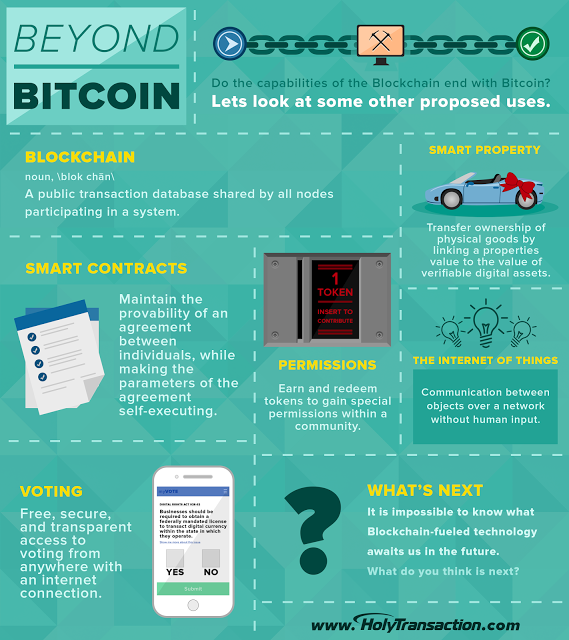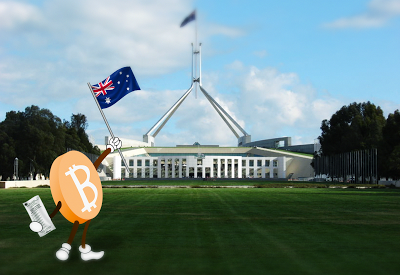
How the blockchain can improve the Australian voting system
Flux Party is a new Australian political party that wants to renovate the voting system by using the blockchain.
How it works
Too old for the Internet era
A revolutionary but not so new idea
Open your free digital wallet here to store your cryptocurrencies in a safe place.
Bitcoin is “digital gold” and will mark the end of cash. Ametrano from IMI Bank explains.
Bitcoin is a private currency, that isn’t issued by any central bank nor guaranteed by any institution. It is electronically transferrable in a practically instant way, utilising a cryptographic security protocol. It is based on a completely decentralized network: the transactions don’t require a middleman, cannot be censored, don’t have any kind of geographical or amount restriction, and are possible 24 hours a day every day and are substantially free.
Open your free digital wallet here to store your cryptocurrencies in a safe place.

What will be the future implications of Bitcoin?
Open your free digital wallet here to store your cryptocurrencies in a safe place.
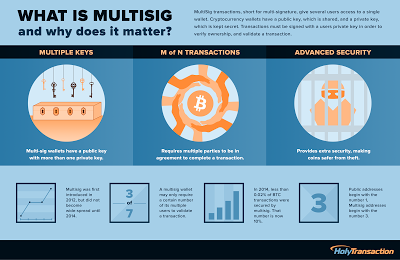
Infographic: What is MultiSig and why does it matter?
Open your free digital wallet here to store your cryptocurrencies in a safe place.
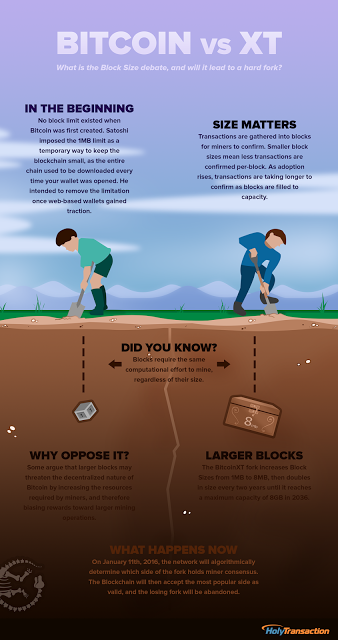
Infographic: What is the Block Size debate, and will it lead to a hard fork?
Open your free digital wallet here to store your cryptocurrencies in a safe place.

Infographic: 5 reasons you should be bullish on Bitcoin!
Open your free digital wallet here to store your cryptocurrencies in a safe place.

Bitcoin can stabilise volatile market in India
(TimesOfIndia) At a time when the country has suffered devaluation of rupee against
dollar, inflation and fuel price volatility in exchange market, two
students of Fellow Programme in Management (FPM) at Indian Institute of
Management, Indore (IIM-I) have rekindled hopes to address the problems
through introduction of ‘Bit Coin’ currency system.
Bitcoin is
a crypto currency which currently has market capitalisation of $8.1
billion. The recognition is mainly because of its introduction during
financial crisis, when trust on government and policy makers was low. It
is an alternative to card networks and money transfer system.
Khadija Vakeel and Nitya Saxena of IIM-I in their study found out that
at a time, when the country is struggling to achieve a respectable
position on matters of financial inclusion, Bit Coin can be a game
changer.
Bitcoin can also lead to a new industry and challenge
for IT youths and can address the problem of brain drain. While
Singapore is pro bit coin, China stands against it. India is yet to take
a side. Users having Bit Coin can enter into virtual goods and services
exchange. The study states that inflation is simply a rise in prices
over a period of time, which is generally the result of the devaluation
of currency.
This is a function of supply and demand. Given the
fact that the supply of bit coins is fixed at a certain amount, unlike
fiat money, the only way for inflation to get out of control is for
demand to disappear.
Open your free digital wallet here to store your cryptocurrencies in a safe place.

Bitcoin Society CEO: Why digital currency is a tool for global good
(CoinDesk) The weekend before last week’s Bitcoin2014 conference in Amsterdam, 22-year-old Matthew Kenahan had a choice to make – one that he said was “probably one of the most difficult decisions I’ve ever had to make”.
rewarded with not only winning the award for ‘Most Impactful Charity’, but also for ‘Bitcoin Champion’ after Andreas Antonopoulos was unable to accept the prize due to a conflict of interest.
My sincere thanks to anyone who voted for me in the blockchain awards. I apologize for not being able to accept due to conflict of interest
— AndreasMAntonopoulos (@aantonop) 16 Maggio 2014
Tool for charity
we’re trying to connect people,” Kenahan explained
“[Bitcoin] allows you to create a unique address, for a very specific cause […]
we see both the incoming and outgoing transactions, and we can see that
it’s used for a very specific cause.”
Image problem
Future plans
Open your free digital wallet here to store your cryptocurrencies in a safe place.
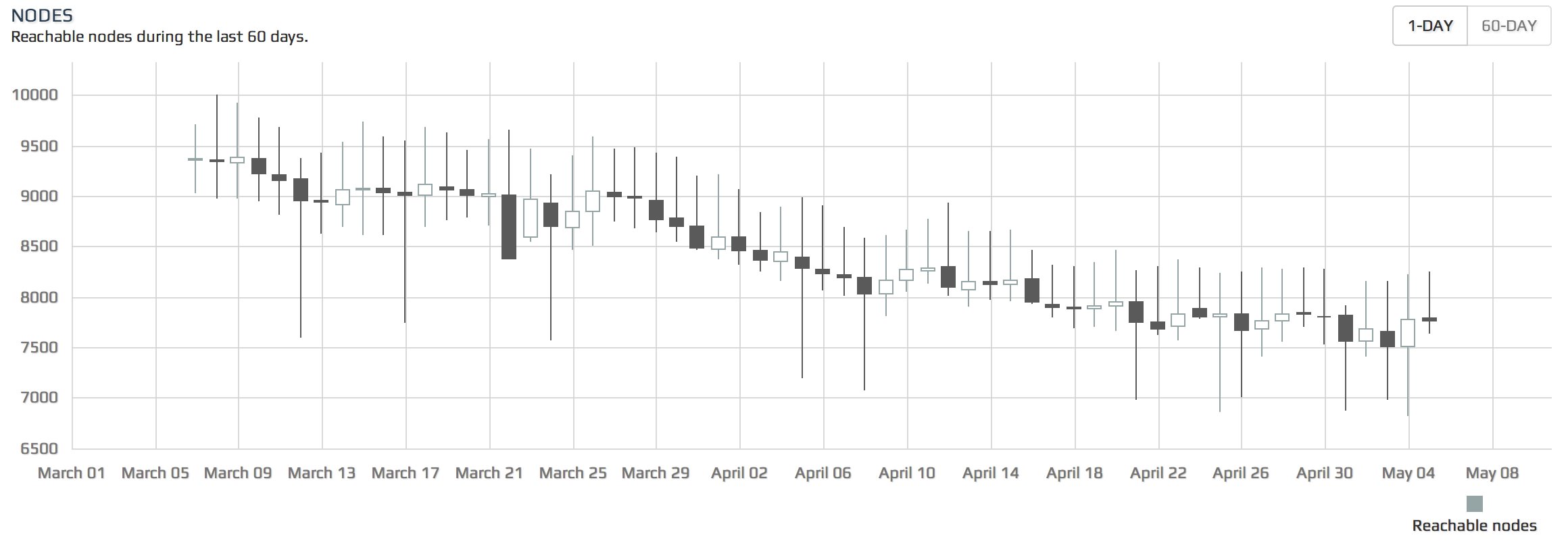
What are Bitcoin nodes and why do we need them?
peer-to-peer (P2P) network. However, what’s often lost in translation is
the sheer amount of machinery that is needed to maintain this global
infrastructure.
transactions, bitcoin requires more than a network of miners processing
transactions, it must broadcast messages across a network using ‘nodes’.
This is the first step in the transaction process that results in a
block confirmation.
network must not only provide an avenue for transactions, but also
remain secure. By using a number of randomly selected nodes, the network
can reduce the problem of double spending – when a user attempts to spend the same digital token twice.
bitcoin doesn’t just need nodes, it requires lots of fully functioning
nodes – nodes that have the bitcoin core client on a machine instance
with the complete block chain. The more nodes there are, the more secure
the network is.
Waning support
at a 60-day chart of bitcoin nodes shows that the number has gone down
significantly. It went from 10,000 reachable nodes in early March to
below 8,000 at the beginning of May.
 |
|
Source: Bitnodes |
interesting is that during a recent 24-hour period, the number of
reachable nodes went down from 8,200 to 7,600 and back to 8,200 again.
This suggests that a portion of users running nodes are turning off
their machines at night, meaning that this contingent of nodes are being
run on desktops or laptops.
 |
|
Source: Bitnodes |
 |
|
A map based on Bitnodes data. Source: Coinviz |
Lack of incentive
running a bitcoin node does not provide any incentive. The only benefit
for someone to run a node is to help protect the network, and based on
the Bitnodes data, the number of people interested in supporting the
network with a full node is waning.
Centralization of mining
terms of supporting the bitcoin network, it used to be a lot easier for
the average user to participate. However, the advent of massive ASIC
data centres has weakened the consensual nature of mining, and by
extension providing nodes, for many people.
“As
bitcoin grows, so does the network and the computing power behind the
scenes required to run it. The majority of bitcoiners won’t be able to
support their own nodes and will be taken over by companies like KnC.”
pushing bitcoin towards a more centralized future. McKelvie also
believes that major technology companies that take interest in bitcoin
will have to put their computing resources behind the digital currency:
“I
wouldn’t be surprised if we see large tech companies like Google and
Amazon throwing resources at bitcoin as they adopt the currency.”
Feedback from nodes
sees the issue of nodes dropping from 10,000 down to under 7,000 as a
significant problem. To Hearn, the core of the issue is disinterest in
both expending computing resources and electricity toward something that
may have diminishing value.
Hearn has proposed added functionality that would allow communications
between nodes and the developers to better understand why so many are
dropping out.
is because their number will continue to decline no matter what – and
they appear to only be working when users are awake during the day.
“It
makes [the bitcoin network] ‘seem’ bigger, more robust and more
decentralised, because there are more people uniting to run it. So
there’s a psychological benefit.”
Moving forward
believes that community attention to the lack of nodes supporting the
network is what the industry needs in order to boost numbers:
“I agree we need more full nodes. I’ve long been a proponent of such calls for more nodes.”
such calls for voluntary support might not be enough motivation for
people to do so, though, so, one logical idea that has been floated is
to give nodes some sort of incentive.
feasible right now: over the past six months, miners have been
averaging a daily reward of 15.98 BTC per day, according to Blockchain.
bitcoin prices would peg that value at around $7,040 per day for the
entire network – and the growth in transaction fees has been incredibly
flat over the past six months. As a result, miners would likely be
reluctant to concede any revenue to bitcoin nodes, which don’t require
pricey ASIC hardware to run.
 |
|
Transaction fees on the network for past six months. Source: Blockchain |
of the bitcoin community seem to be losing interest in hosting full
nodes. And it’s something to pay attention to, because over time it
might mean that the major companies in the industry may have to pick up
the slack.
the network as full nodes, though, it continues to lessen the amount of
decentralization the network has at an infrastructure level.
is all down to circumstances surrounding bitcoin sentiment – the rise of
ASICs, the selloffs in China and complete collapse of Mt. Gox – plus
little in the way of incentives for someone to run a node.
Open your free digital wallet here to store your cryptocurrencies in a safe place.


